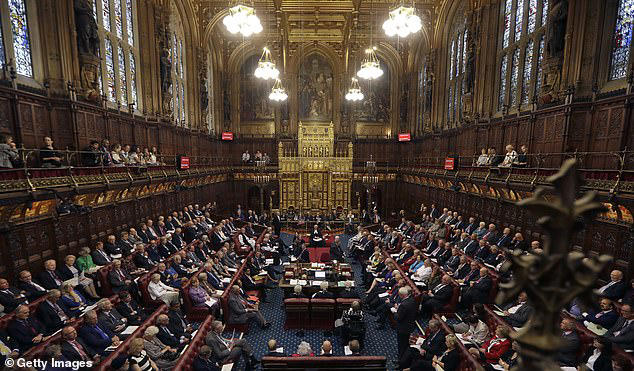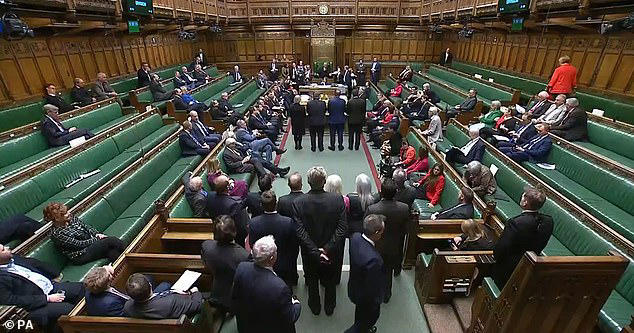Rishi Sunak last night saw his Rwanda Bill pass unamended through the House of Commons as he continued his efforts to 'Stop the Boats'.
The Prime Minister secured victory after a threatened widespread rebellion against the legislation by Tory MPs melted away.
Formally titled the Safety of Rwanda (Asylum and Immigration) Bill, the draft laws are aimed at ensuring migrant deportation flights to Rwanda finally get off the ground.
Both the Bill and a new treaty agreed with Kigali are part of Mr Sunak's strategy for manoeuvring around last year's Supreme Court ruling against the asylum scheme.
But despite MPs approving the legislation, there are still a number of hurdles for Mr Sunak to clear before a first plane-load of asylum seekers might arrive in Africa.
The House of Lords
Now MPs have approved the Third Reading of the Rwanda Bill, it passes to the House of Lords for peers to scrutinise the legislation.
As happened in the Commons, the Bill will have to go through the same stages it did when it was debated by MPs - a First Reading, Second Reading, Committee Stage, Report Stage and, finally, a Third Reading.
Downing Street is braced for peers to try and amend the Rwanda Bill as it passes through the upper chamber.
The controversial nature of both the legislation and the Rwanda scheme means it is highly likely that members of the Lords will attempt to change the Bill.
One leading peer, crossbencher Lord Carlile, has also warned some of his colleagues in the unelected House might try and 'kill' the legislation.
He told Sky News: 'The House of Lords is not in the business of killing Bills that come from the House of Commons - our first task is to try and make it work.
'But there are some of us who might well consider killing it, if what emerges is not acceptable under UK legal norms.'
Mr Sunak has warned peers not to 'frustrate the will of the people' and told them to 'do the right thing' when it comes to the Rwanda Bill.
'Ping-pong'
Should peers successfully amend the Rwanda Bill in the Lords, the Government might try and remove those amendments when the legislation returns to the Commons.
This would prompt a process known as 'ping-pong' whereby a Bill passes between the Commons and the Lords as MPs and peers attempt to settle on a final version of legislation.
Lord Carlile insisted it was 'right' for peers to send the Rwanda Bill back to the Commons 'repeatedly if necessary'.
A period of 'ping-pong' could also revive the prospect of Tory revolt in the Commons, after Conservative rebels warned they could re-mobilise if peers try to make changes to the Bill that weaken its powers.
'Tonight is not the end of matters... the PM is by no means out of the woods,' a source said, as the Bill passed its Third Reading in the Commons.
Royal Assent
If the Government accepts Lords amendments, or peers concede defeat in repeatedly trying to amend the Bill during 'ping-pong', the legislation will then receive Royal Assent.
This will then turn the Bill into an Act of Parliament and it will formally put the legislation onto the UK's statute book.
New Rwanda treaty
As part of his efforts to get around last year's Supreme Court ruling that the Rwanda scheme is unlawful, the PM has also updated a treaty with Kigali.
It is meant to prevent anyone sent to Rwanda from subsequently being transferred to a country where they could be at risk, a principle known as non-refoulement.
Parliament must ratify the treaty as well as the Bill, but this will be a more straightforward process because MPs cannot table amendments to treaties.
Yet, in a sign of the opposition the plan is expected to face in the upper chamber, peers have said the agreement should not be formally approved until safeguards against refoulement are complete.
The Lords International Agreements Committee (IAC) warned that 'further legal and practical steps are required' which will take time to implement.
Passage of Rwandan law
One of the IAC's key points was the Rwandan parliament has yet to pass a new asylum law in order to enact the commitments it has made to prevent refoulement in the updated treaty.
Rwandan President Paul Kagame recently appeared to express frustration at the length of time it is taking to get the asylum scheme up and running.
Asked about the current political and legal obstacles around the UK's deal with his country, Mr Kagame told the BBC it is 'not Rwanda's problem'.
'Ask the UK, it is the UK's problem, not Rwanda's problem', he added.
The Rwandan President also suggested he could return money to the UK if no asylum seekers are sent to his country.
Britain has already committed a total of £290million to Kigali as part of the scheme.
Further legal challenges
The Rwanda Bill is designed to exclude most grounds for individuals to appeal against a decision to transfer them to Rwanda in the UK’s domestic courts.
But it does not do is prevent claimants from going to the European Court of Human Rights, which would be bound by neither the Bill nor the treaty.
A planned inaugral migrant deportation flight to Rwanda was dramatically halted at the 11th hour in June 2022 when the ECHR issued an urgent 'Rule 39' order.
This prevented the removal of a person to Rwanda, with a Strasbourg judge saying they should not be deported until after a final decision had been made by the UK courts.
No migrant flights from the UK to Africa have since taken place, despite taxpayers having already handed over millions of pounds to Kigali.
'Pyjama injunctions'
The 'Rule 39' order issued by the ECHR in June 2022 has led to fears that similar 'pyjama injunctions' - named as such due to their often late-night nature - could yet be used to block further migrant flights.
Mr Sunak has vowed he would be prepared to ignore future Rule 39 orders but it is unclear what the consequences of this would be in practice.
The Government has set out draft guidance for civil servants advising that it is their 'responsibility' to implement ministerial decisions and disregard such injunctions. By Greg Heffer, Political Correspondent, Mailonline







